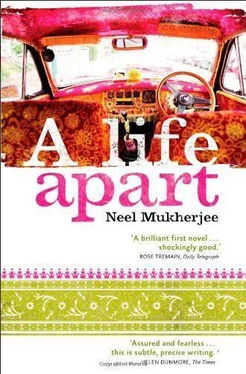Ritwik is so taken aback by this fiction, by the delusional questions, he can only answer simply, ‘No, you never did.’
‘Don’t lie,’ he shouts and drops the belt.
‘Zafar, you’re mistaken. Look, calm down, please. You never mentioned anything about it last time. This is what I do for a living.’ Ritwik seizes the momentary silence from Zafar to press ahead with a barrage of information. ‘I’m an illegal immigrant in this country, I have no working papers, no permit to stay, to work. That’s what pays for my food and clothes.’
‘Do you work for anyone?’
‘No, I don’t,’ he says firmly.
‘Are you sure?’
‘What do you mean am I sure?’ Ritwik lets his anger leach out into his voice. ‘You mean if your hard-earned pennies are going to someone else? No, let me assure you, they’re not. I stuff them in a little box at home. I can’t have a bank account, obviously. If you don’t believe me, why don’t you come along with me and see where and how I live?’ There is acid in his words now.
Zafar looks away and goes over to the bar. He pours out two drinks and brings one to Ritwik.
‘Try downing it in one go.’ His voice is distantly caring again, as if nothing has happened to ruffle the placidity of general life.
Ritwik sits and stares at the oily swirl of the ice and whisky in the heavy tumbler. He has never had to articulate his position of no exit to anyone before and now that he has somehow let it slip out in a moment of weakness, of defence, even, it becomes enormous and all-consuming, the sound of it so deafening that there is nothing else but this roaring by which he is defined, against which every other note in his little life is sounded. The room shrinks to the size of a grain of sand within which his whole body is compacted.
Ritwik lies on the bed and finishes the last bit of his hot, sweet milk that Zafar has ordered from the invisible people downstairs. He briefly imagines himself with a milk moustache, licks his upper lip and subsides in the soft sea of linen and silk. He is so tempted to close his eyes and give in to sleep right here but the thought of Anne alone in Ganymede Road nags at him. Zafar has once again had his brief and imperative pleasure from Ritwik before rolling off him and disappearing into the living room with a thrown away, ‘I have to finish some work before tomorrow morning. Urgent stuff. Why don’t you have a nap here and then I can drive you back later.’
Ritwik can hear the shuffling of papers, the snap of opening and closing of briefcases, a low-voiced telephone call, as he dozes desultorily and wonders whether he can ever ask Zafar if his, Ritwik’s, pleasure is not important to him at all. Even in his blurred world of half-sleep he keeps trying to remind himself that this is business, not an ordinary pick-up; questions of his pleasure here are irrelevant, even presumptuous.
He chooses not to think about Zafar’s naked display of proprietoriness an hour or so ago. Like all things that dredge the murky depths inside his head, he lets it sink down; he knows its disturbing demands on his attention will resurface later. While he is musing on such imponderables, Zafar pokes his head through the bedroom door and says, ‘I’m going to have a shower. Why don’t you get dressed if you’re feeling better and I can take you home?’
As soon as Zafar is gone, Ritwik gets out of bed and walks into the living room. Zafar’s papers lie strewn on the polished dark walnut table. There is a laptop with a winking light amidst the pen, the slimline leather briefcase, the papers and folders, and a couple of video cassettes. The briefcase is open and lazily, uncuriously, Ritwik glances inside. There are four passports. The desire to know Zafar’s surname is immediate. He picks one up — it is a Jordanian one — and opens it. Zafar abu Bakr al-Aziz bin Hashm. Born 1947, Amman. The photograph shows a cruelly handsome man in his twenties. It is only when he looks at the other passports that Ritwik is woken out of his passive and blunt curiosity. The remaining three are all issued by different countries — Syria, Saudi Arabia, and the United Kingdom. In each, the date of birth, the name, the photograph and the place of birth are different.
Something unknown begins a slow ticking inside his head. Initially, he identifies it as a vague and intangible envy for someone who has not one, but four travel documents and, therefore, such freedom of travel as four nationalities might allow: Ritwik correlates number of passports to ease of entering and leaving borders. But it doesn’t explain a more smoky unease building up in little wisps and grains inside him. He takes a perfunctory glance at the spill of papers everywhere. A fat and battered filofax lies open, but before he has had time to have a quick, furtive browse, some sixth sense in him registers that the sound of the shower has stopped and urges him to move away. He tiptoes into the bedroom, sits on the edge of the bed and starts putting his clothes on.
Zafar enters the room and asks him, ‘You feeling better?’
‘Yes, much, thanks.’
Zafar ruffles his hair in a surprise gesture of affection before starting to dress. ‘Let me put some clothes on and we’ll be on our way.’
In the car, he is unusually friendly, asking Ritwik questions about his family, his origins, his education, how he came to England, questions which Ritwik tries to evade, some successfully, others not. Zafar even puts his hand on Ritwik’s thigh a couple of times and leaves it there. He decides to frame a careful question.
‘So, Zafar, you never told me what you did for a living.’
A long silence during which it seems Zafar is trying to make up his mind whether to give an honest answer. At last he says, ‘I work for some departments of the British government.’
‘What does that mean? You’re a spy?’
Zafar laughs. ‘You’ve been reading too much Le Carré.’
‘What then?’ Ritwik persists.
‘Oh, I’m a sort of business broker. I get international clients for British-manufactured stuff.’
‘What sort of stuff?’
‘You know what happened to the cat who was curious?’ Zafar asks, laughing, but there is no hiding the deterring emphasis behind the words.
‘Yes, I do, but you also know what brought it back, don’t you?’ Ritwik adds, with feigned innocence.
Zafar doesn’t reply. After a while, while they are on Vauxhall Bridge Road, he tries again.
‘So when are you going back to your country?’
‘In a few days.’ He has become laconic again.
Ritwik decides to hold his tongue; Zafar is unreadable and besides, what does it matter to him what the man does for a living?
As the traffic starts moving, Zafar seems released into another short burst of affability. ‘You know, maybe you shouldn’t go there again.’
Silence.
‘In fact, I’m asking you not to go there. If it’s money you’re worried about, I can see to that, it’s no problem.’
Ritwik’s senses prick up, like a cat’s ears, but he remains quiet in the fear that any word might break this delicate spell of generosity and make Zafar retract everything.
‘I can settle something on you. I come to London quite often and when I’m here, you can see me. What do you think?’
Settle. What a strange word. Dust settles, memories settle, agitated liquids settle, but money for exclusive access to bad sex? Does that settle too?
‘You must be joking.’ Ritwik cannot believe what he is hearing.
‘You can be my friend, only mine.’ Once again, Ritwik is thrown by the slippage in such an innocuous word.
‘Why are you doing this? You don’t know me at all.’
‘Do you mean, you don’t know me ? Is that what is bothering you?’
Читать дальше












